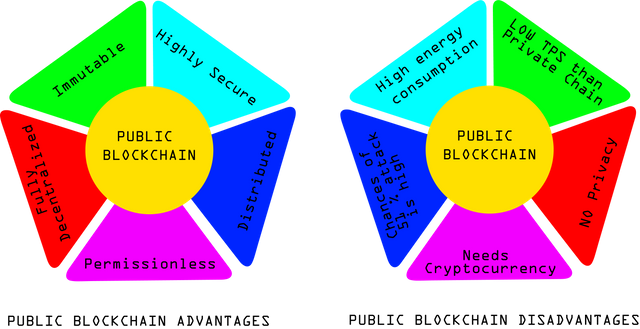Types of Blockchains homework by @hdnakum- Steemit Crypto Academy Season 4 - Homework Post for Task 5
Hello Steemians,
Good afternoon everybody,
Namastey to #steemitcrytoacademy -The most engaged and plagiarism-free community.
I'm @hdnakum. First of all, I would like to appreciate @steem4u for writing quite a knowledge enriching content as homework. Today, I have started writing my homework 5 (lectured by @stream4u) just after completion of homework 1,2,3, and 4 lectured by @sapwood, @awesononso and @yousafharoonkhan.
I thank all the professors for enriching our knowledge about the crypto-world on #steemitcrytoacademy. Homework 5 is all about understanding Bitcoin, Cryptocurrencies and Public blockchains. In this homework, I will write down an answer to the third question elaborately. Stay tuned.

MAIN QUESTION:
What Is Public Chain and What will be the Advantages and Disadvantages of Public Chain?
When you are reading this post on steemit, I assume that you are well aware of the word BLOCKCHAIN - The new technology behind cryptocurrencies.
In short, Blockchain is a universal distributed ledger that records each and every transaction carried out by users of that particular Blockchain. Blockchain technology is mainly backed by a branch of mathematics called Cryptography.
There are mainly three types of Blockchain
- Public Blockchain - Bitcoin, Ethereum, Solana, etc
- Private Blockchain - R3’s Corda, Morpheus, Hyperledger, Hashgraph
- Permissioned (consortium) Blockchain - Ripple, IBM Food Trust
Out of all the three Blockchain, Public and private blockchains are most commonly used but Permissioned Blockchain has gained some attention from the developers because it is a cocktail of both public and private blockchain in terms of properties.
A public blockchain is a blockchain network that allows anyone to join, read, participate and contribute to the network anytime anywhere. Basically is a permissionless Blockchain protocol where there is no central authority to decide whom to let join the network and whom to stop joining the network.
You must be wondering that how the data can be so much secure in public blockchain if it is open to the public? Well, you have a quite legit question but remember that the data is only open once it is validated on the blockchain through miners or witnesses or representatives. That's why the data can not be modified once validated.
(A) Advantages of the public blockchain
Permissionless- The public blockchain is open to all. Anyone can be a part of the blockchain network. As it is open to all, it has nothing to do with your identity. In short, Public blockchain doesn't want to know who the hell you are. Meanwhile, every user is empowered to take decisions (of course by voting) as there is no central authority.
Fully Decentralization– As stated above, the public blockchain has no centralized entities to rule the blockchain thus, the blockchain is maintained by the nodes. Nodes upgrade the distributed ledger from time to time with help from a consensus algorithm.
Immutable - The data (block) once validated/minted by Miner or validators or Witnesses can be never modified in the future because the change in one block will need to changes the data of the previous and next block and so on. A practically impossible task to change data once the block is validated.
Highly Secure- The blockchain is made up of a block that is connected to the previous block by its particular Hash number and so on. For instance, if a hacker has managed to change the data carried by one block, still he can not hack other blocks connected to that block because the change in any data of any block will automatically change the original hash of the block, which will later be non-valid block. To hack the entire blockchain, one has to go backwards one by one changing hashes of every block accordingly on every node that runs the network, which looks impossible isn't it?
Distributed Ledger- In the public blockchain, the data is not stored at one place or on one node (centralized), rather it is distributed to all nodes/computers making it a secure distributed ledger.
Examples of Public Blockchain- Almost all the blockchains which have thier native tokens are public blockchains. Bitcoin, Binance smart chain, Tron, Solana, Terra, Luna, Ethereum, Hive, Zilliqa, Litecoin, Steemit etc.

(B) Disadvantages of the Public Blockchain
Needs to be incentivized- In the public Blockchain, there is no central authority to run the network. Now to run this pubic Blockchain network consistently, the network needs non-stop working nodes (24/7) to process and validate transactions. The question is why would anyone run their nodes 24/7 and for what? To solve this problem, the blockchain developer incentivizes (rewards) by their native token to the miner/validators or witnesses for running their nodes all the time for creating new blocks. That's how Cryptocurrencies are coming into existent through the public blockchain.
51% Attacks- In a public blockchain, there is a huge possibility of collusion if a group of miners control over 50% of total computing power.
Energy Consumption- Those public blockchains that run on a proof of work consensus mechanism consumes lots of power to produce valid block bundled with lots of transaction in it by the valid nonce. Hashing is a tedious mathematical algorithm that all computers do repeatedly until the valid block is mined. Quite a power-consuming process - known as mining.
Transactions per/second (TPS)- Nowadays Public blockchains are quite fast. for instance, the Solana blockchain can transact in 47k per second. but still, it is always slower than the private Blockchain.
No Privacy- As the public chain is open to all, anyone can check your wallet (if they know the address is yours), your transactions, and even can get an idea of how much money you have earned through investment or trading in the crypto-market, provided they know your wallet address.
- Promote Illegal activity- As anyone can send the crypto assets to anyone without being identified which indirectly promote money laundering, drug trafficking and terrorism, Many reports stated that as well earlier.
We estimate that around $76 billion of illegal activity per year involve bitcoin (46% of bitcoin transactions), which is close to the scale of the U.S. and European markets for illegal drugs Source.
We all know that we can trackback every illegal transaction and the culprit can be jailed after a long investigation but it is not worth it, once the damage is done - @hdnakum
The blockchain which is not open to the public and governs by a single authority is called a Private blockchain. If you want to read, audit, or write data on these private blockchains, the first thing you have to do is take permission from the governing authority with the proof of identity. Private blockchain always needs to know who is reading and writing in the blockchain networks.
All you need to know about private blockchain is you need to expose your identity to the network in order to read, write, and validate anything in the network.
(A) Advantages of the Private blockchain
Low transaction fees-
As compared to a public blockchain, the transaction fees are extremely trifling. Moreover, the transaction fee does not change with the number of requested transactions (ethereum gas-free increases with the increasing transactions at a time). The transaction fee for the private blockchain is always constant without any hidden fee.Allow legal Activity only- Anonymity is the biggest threat to the public blockchain (as stated above) because any once can transfer money to anyone for illegal activity. In the case of a private blockchain, there is no room for this kind of illegal activity because thier central authority knows all the people participating in the network.
Regulated- As discussed above, the private blockchain is regulated by the central authority and that's why it helps to prevent misuse of the private blockchain for an illegal transaction provided the central authority is authentic.
Faster than Public Chain- The transaction carried out by using Private blockchain is way faster than any of the Public blockchain because, in the public blockchain, the transaction gets validated by various nodes which of course takes time. In the private blockchain, only authorities need to validate transactions that are fast, easy, concede low fees, and secure as well.
Examples- There are some popular private blockchains such as Morpheus private Blockchain works on logistics, whereas R3’s Corda, which works in the same manners as ethereum, is highly regulated or governed by institutions. Hyperledger and Hashgraph also fall in the category of private blockchain. one more drawback is Nodes can remove or add the block whenever needed.

(B) Disadvantages of the Private Blockchain
Only Partial Decentralized– Unlike a public blockchain, In the Private blockchain the centralized authority can biasedly determines who can be the node with unequal powers to run the blockchain. Moreover, it is not open to the public to even audit the blockchain that's why it is also known as the partially decentralized blockchain.
Less Transparent– As the private blockchain is governed by central authorities and the nodes elected by them, there is more chance to misuse the network. Even authority or main nodes can add and delete the block at any given time to hide some important data or transactions.
As stated in the introduction, consortium blockchain is a cocktail of both public and private blockchain. This kind of blockchain is most suited for organizations that need more than one central authority that facilitates auditing, reading, and writing the blockchain. This kind of blockchain is more decentralized than private blockchain because they have no single authority to run the blockchain (centralized) instead, they have multiple authorities to run the chain.

In short, The Consortium blockchain is less decentralized than the public blockchain and more decentralized than the private blockchain, however slow in carrying out the transaction than Private blockchain and faster than Public blockchain.
We will now see the difference between all the Public, Private and Consortium blockchains by their various parameters.
| DETAIL | Public | Consortium | Private |
|---|---|---|---|
| Access | Anyone, open to public | Selected | Selected |
| Authority | Fully Decentralized | Partially Decentralized | Centralized |
| Transaction Speed | Slow | Medium | Fast |
| Efficiency | Low | Medium | High |
| TXn Fee | High | Medium and stable | Low and stable |
| Consensus | Permissionless | Partially Permissioned | Permissioned |
| Scalability | Low | Scalable | Highly Scalable |
| Incentivized? | Yes, need Cryptocurrency | Yes, if Agreed by All authorities | No |
| Privacy | Full Privacy | No Privacy | No privacy |
| Immutability | Full | Partial | Partial |
| Energy Consumption | HIgh | Average | Lowest |
| Examples | Bitcoin, Ethereum, Solana, Terra | Ripple, IBM Food Trust | Morpheus, Hyperledger, Hashgraph |

Conclusion
By researching more about every type of blockchain, I came to the conclusion that Public blockchains are more reliable and most decentralized than both the other types mentioned above but still bad actors are using this amazing technology for destructive work which is beyond my imagination. The public blockchain makes the work of the scammer easier than before. There have been many reports published about using cryptocurrency for unethical work. What I believe is people need to be more ethical, especially the scammers, if they are not, no technology is gonna help human beings.
In the end, I would like to thank @stream4u for an amazing Homework5S4 that inspired me to understand other various types of blockchain available out there, however, @stream4u ask to write only about Public Blockchain. Thank you all for bearing with me. Have a great Day ahead




All the best to your homework tasks
Thank you for your comment @jyoti-thelight